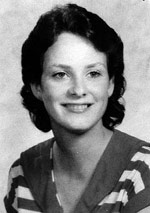1988
Summary: 22 year old Noreen Malloy was robbed and murdered outside of a McDonald's she managed in Pittsburgh.
 |
Source #1 |  |


Source: Post-Gazette.com Page 1 - Page 2
The Allegheny County district attorney's office said yesterday it will not oppose DNA testing in a 1988 homicide case, signaling a change in policy that grew out of the recent exoneration of Homewood man on a wrongful rape conviction.
District Attorney Stephen A. Zappala Jr. said he changed his approach to the use of DNA testing after his experience with the exoneration of Thomas Doswell last month -- a test his office initially fought to stop.
He said it prompted him to take a new look at a 2003 state law authorizing DNA testing for those convicted of major crimes.
It says a defendant has to persuade a judge that DNA testing will prove actual innocence. Zappala said he previously felt if a convict could not prove that DNA was the only element that caused a conviction, his office would oppose the testing, which can cost up to $1,000 per specimen.
After Doswell was released from 19 years in prison for a rape conviction when DNA testing proved his innocence, Zappala said he began to examine every such case personally with the new belief that if a judge rules the testing should be done, he will not fight it.
"Let's see what we've got. If there is any possibility this guy didn't do it, let's check it," said Zappala.
So when Common Pleas Judge Walter Little ordered DNA testing in the 1988 slaying of a 22-year-old McDonald's restaurant manager, Zappala said that his office would not appeal the order. The ruling breathed new life in the case of Drew Whitley, who was sentenced to life in prison and who has been fighting for a decade for DNA testing to prove his innocence.
After the hearing, Whitley, who has long claimed testing will prove he is not the man who waited outside a McDonald's near Kennywood Park to rob, then murder Noreen Malloy said he was "very happy." He called the case "a nightmare," and repeated what he has said since his imprisonment 17 years ago: "I'm an innocent man."
The testing will be performed on 39 pieces of hair that were found at the crime scene.
During the protracted legal battle in the Whitley case, two hair samples were destroyed and deemed scientifically inconclusive in determining if they were Whitley's. Then prosecutors claimed for a time that the rest of the DNA samples were lost in a downtown flood.
After the hairs were found in 2004, Whitley argued they should be tested because during his 1989 trial the district attorney's office offered testimony from experts -- who did not have the benefit of DNA testing -- who said the hair found in the mask worn by Malloy's assailant closely resembled Whitley's.
"That was the strongest evidence in the case," said Scott Coffey, Whitley's appellate lawyer.
Prosecutors also believe even if the hair does not match Whitley, a jury would convict him again because two independent witnesses implicated him in the crime. One of them repeatedly denied seeing Whitley at the murder scene, then changed his story. The other is a two-time convicted murderer who escaped a death sentence after testifying Whitley confessed to him in prison. Whitley claims he never met either of the witnesses.
Yesterday, Coffey suggested the witness testimony was faulty and that a coat and hat worn by the assailant did not fit Whitley, causing the hair evidence to be extremely important.
"If these hairs are found not to be his, I believe he will be proven innocent," Coffey said.
Added: December 27, 2005
| Death Toll: 1 | Back to Timeline | Top of Page |